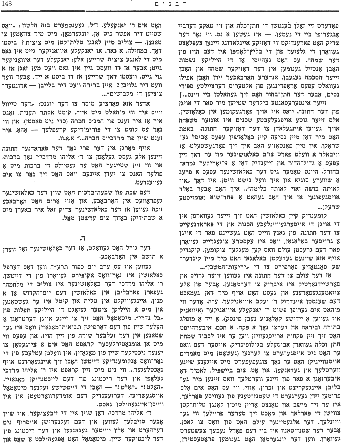
[Page 143]
As soon as the Rebbe finished inviting his “guests,” the light bulbs in the house burst from joy. This meant that the holy souls participated in the celebration, and gave their approval to it. Some Horbacha Jews wanted to dispute Alterka's miracle stories, but he didn't budge from his claims.
I can still see the interesting scene at the wedding held in Kholozhin. Since we were good neighbors, our family was also invited to that wedding, though I must admit that the trip to Kholozhin scared me a bit. I imagined that since people were traveling to Kholozhin, the Rebbe was a preeminent scholar who would ask me a difficult question about a passage of Talmud that I couldn't answer. I was scared of such an embarrassing situation. I found out, however, that my fears were unfounded.
When we arrived in Kholozhin, we saw the unusual preparations and pageantry for the wedding, and from a distance we could see the entire booth for the large number of expected guests. The beautifully covered booth appeared to my youthful eyes as curtains of the Temple in Jerusalem.
It goes without saying that there were huge numbers of people invited to the wedding. Of all the guests and travelers attending the wedding, I was most impressed with R. Yaakov Ivaniker, known as R. Yankele Ivanik (Ivanik was a Jewish colony near Pinsk). He was a tremendous scholar and very pious, as well as a clever and wise person. His cleverness showed through especially when he became a bit tipsy in honor of the couple. Aside from the fact that he didn't stop studying (he knew writings by heart), he added his own beautiful sayings and ideas. For example, let me recount a couple of his maxims that I still recall. He disapproved of mixed dancing, and decided to interfere with some boys and girls dancing together by going right in the middle wearing his long tzitzit, thereby making the festivities even more enjoyable than usual, and causing everyone to break out in laughter. This interference, however, upset one couple, and the young man decided to protest. R. Yankele answered, “Why does it bother you to dance with me, young man? Is it because of my long tzitzit? Forgive me, but you are foolish. Whenever Yankele Ivaniker goes into the street wearing his long tzitzit, everyone knows that it's Yankele. But when you go out on the street, they say that you are a gentile. You'll then yell out that you're a Jew, but who's going to believe you? You'll have no choice but to undress...”
Here's another example of his way of chastising the youth: “The devil knows what's doing with you. On the Fast of Esther you say that you're from Haman's people (so that you don't have to fast), and as soon as you see the Purim dumplings, suddenly you turn into Mordechai's people.”
The morning after the wedding, all the guests went to R. Eliyahu Mordechai to get blessings, and as was his custom, he would bless each person with his hand. On the Sabbath of the week of the wedding festivities [Sheva Brachot – Seven Blessings], he visited Horbacha, so that Horbacha also benefited from the first Sabbath visit to their town.
The Funeral of the Kholozhiner Rebbe
The funeral of the Kholozhiner Rebbe, the Blacksmith, R. Eliyahu Mordechai Levinovitz, who died on October 20, 1932. In the background people are carrying his coffin. The entire town accompanied the deceased to his eternal rest at the New Drohitchin Cemetery.
Previous Page
|
Next Page
JewishGen, Inc. makes no representations regarding the accuracy of
the translation. The reader may wish to refer to the original material
for verification.
JewishGen is not responsible for inaccuracies or omissions in the original work and cannot rewrite or edit the text to correct inaccuracies and/or omissions.
Our mission is to produce a translation of the original work and we cannot verify the accuracy of statements or alter facts cited.
 Drogichin, Belarus
Drogichin, Belarus
 Yizkor Book Project
Yizkor Book Project
 JewishGen Home Page
JewishGen Home Page
Copyright © 1999-2025 by JewishGen, Inc.
Updated 13 Dec 2001 by LA